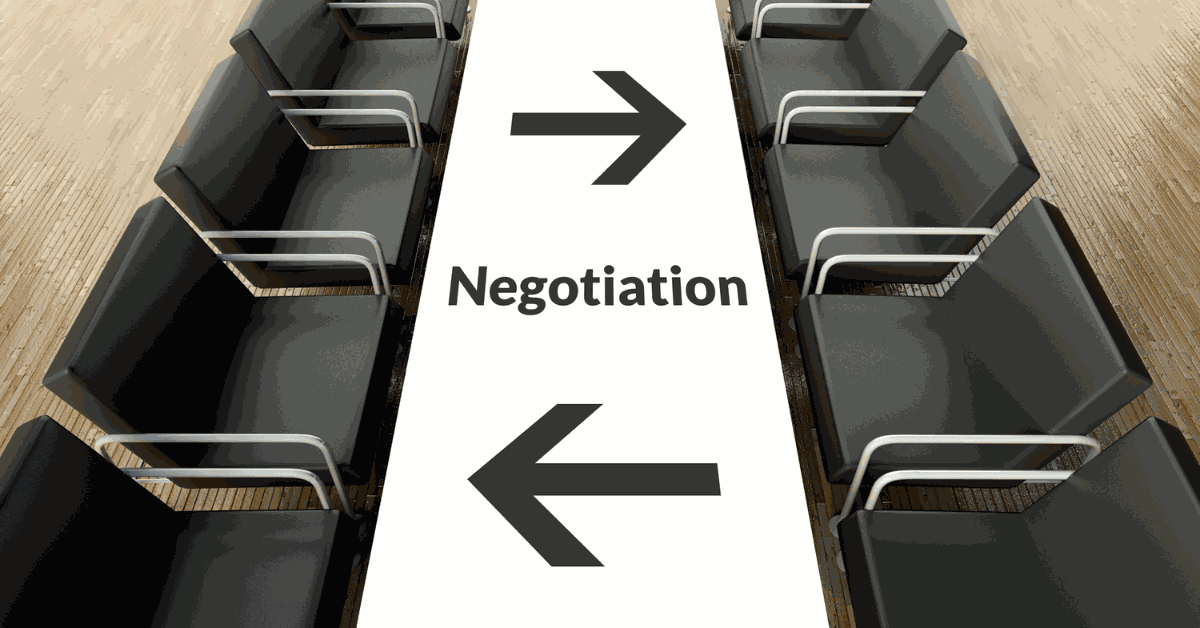When fewer than 1% of cases go to trial, there is a noticeable lack of focus on the negotiations phase of litigation and instead an outsized focus on trial. This leads to avoidable errors in communication, transparency, handling aggressive plaintiff attorneys, and other common litigation negotiation mistakes. Avoid these mistakes by learning a few techniques and philosophies endorsed and employed by the experts at Courtroom Sciences.
What are the biggest litigation negotiation mistakes?
Common litigation negotiation mistakes often stem from an overemphasis on trials, despite their rarity. Mistakes can include using a uniform negotiation approach, poor or non-existent communication, lack of transparency, and overlooking leverage points. These pitfalls can be solved with an adaptable approach, emphasizing open communication and key point identification.
#1: Negotiation Approach: Not a One-Size-Fits-All
Not every case follows the same trajectory, and employing a uniform negotiation strategy can be a costly mistake. Each case is unique. Therefore, it’s imperative for the defense to tailor its approach based on the specifics of each case. Looking at facts, circumstances, and the parties involved is a good start.
Ask yourself these questions:
-What is the nature of the dispute?
-Who are the parties involved?
-Are there legal precedents, and if so, which?
-What’s the overall context of the case?
By using these questions as a starting place to better understand the nuances of each case, negotiators can capitalize on the distinctive elements that can influence the negotiation process and increase their chances for success. Complexities are inherent in legal disputes, and it’s important to tailor negotiations on a case-by-case basis.
#2: Lack of Communication and Transparency
Timing is everything. Bill Mitchell, Founding Partner of Cruser & Mitchell LLP, uses the metaphor of a kaleidoscope to highlight the dynamic nature of cases. Leverage points can change continually, and quick identification of these points can be crucial for negotiation success. One big litigation negotiation mistake can be a failure to initiate early and transparent communication with opposing counsel. By engaging in early negotiation and communication, you can better understand current leverage points and the opposing position.
The best method to mitigate the lack of communication is to pick up the phone, engage in open discussions, and foster transparent communication with opposing counsel right from the outset. Address concerns, exchange information, and identify potential leverage points collaboratively. Withholding information under the impression that it is advantageous to keep unnecessary details confidential is a common misconception. Offering objective information can be a powerful tool to counter inaccurate claims and dissuade plaintiffs from pursuing unwarranted legal battles.
#3: Overlooking Key Leverage Points
One of the biggest mistakes in litigation negotiations is not finding the right leverage points – for example, if a plaintiff is undergoing financial difficulties, stress, or other challenges unrelated to the case, these can serve as leverage points for the defense. Unforeseen challenges, when identified and addressed effectively, can also serve as leverage: discovering a legal loophole, a procedural error, or new evidence that strengthens one party’s position and could fundamentally shift the negotiation dynamics.
Negotiation mistakes often occur when individuals fail to recognize and capitalize on critical leverage points within a case that could significantly impact the negotiation dynamics. This oversight may result from a lack of thorough analysis, a failure to consider the broader context of the legal dispute, or a lack of time or resources needed to acquire the required data, among other reasons.
One specific example of this might involve overlooking geographical inconveniences for the plaintiff. In some cases, a plaintiff may face logistical challenges related to the location of the legal proceedings. For instance, if a plaintiff resides in a different state or country from the jurisdiction where the case is being heard, this could present a leverage point for the defense. Legal teams can leverage this geographical inconvenience to negotiate more favorable terms, such as pushing for a settlement to avoid the additional complications associated with a cross-border or long-distance litigation process.
The solution lies in conducting a comprehensive examination to identify all potential leverage points that can be strategically utilized during the negotiation process.
#4: Only a Small Percentage of Cases Go to Trial
A common issue in litigation negotiation often arises from insufficient readiness for trial proceedings rather than a reluctance to consider them. This lack of preparation can hinder effective negotiations, as individuals may underestimate the potential risks and uncertainties associated with the litigation. Some attorneys, mindful of the resources required for trial, may bypass comprehensive trial preparations, impacting their ability to negotiate effectively.
This shortfall becomes particularly evident when negotiators fail to foresee and address potential challenges, hindering the development of a strategic negotiation stance. The solution to this oversight is to recognize the imperative of thorough trial preparation, emphasizing a proactive approach in evaluating the intricacies of the case. Specifically, a plaintiff lawyer might neglect meaningful negotiations due to inadequate trial preparation concerns, which could result in missed opportunities for a favorable resolution. For the defense, investing in trial preparation and strategic negotiation training is crucial, given that the majority of legal disputes find resolution through negotiations and settlements.
#5: Handling Aggressive Plaintiff Attorneys
Don’t succumb to pressure from belligerent plaintiff attorneys – and don’t be one. A common pitfall in litigation negotiation occurs when defense counsel reacts defensively or becomes overwhelmed by the confrontational tactics employed by opposing parties. The best solution in these situations is to leverage trained negotiation skills to effectively navigate conversations with hostile counterparts. Don’t react; and remember especially not to react impulsively – when defense counsel maintains composure, identifies common ground, and strategically uses communication techniques to de-escalate confrontations, the conversation can be steered toward a more constructive outcome.
A common mistake is a failure to counter aggressive demands. Suppose a plaintiff attorney aggressively demands a settlement amount that significantly exceeds the case’s valuation. A negotiator versed in effective strategies would refrain from immediate acceptance or rejection. Instead, they might present a counter-narrative, citing precedents, legal nuances, or potential weaknesses in the plaintiff’s case. By adeptly managing expectations and steering the conversation toward a more reasonable middle ground, the negotiator can foster a more constructive negotiation process. By employing active listening and demonstrating a willingness to address valid issues, the negotiator can diffuse hostility and create a more conducive environment for reaching a mutually beneficial agreement.
#6 Lack of Negotiation Training
When the defense counsel assumes negotiation skills are intuitive and neglects the need for formal training it can significantly impact and hinder the effectiveness of the negotiation process. Bill Mitchell’s and Robb Cruser’s book, “The Disruptive Lawyer’s Little Black Book of Negotiation,” looks at the significance of comprehensive negotiation education. When legal professionals underestimate the nuances and complexities involved in negotiations, it can lead to missed opportunities and suboptimal outcomes. The solution is to recognize the importance of negotiation skills and invest in formal training programs and expert consultants.
Consider a defense counsel relying solely on legal expertise without formal negotiation training. This individual may struggle to navigate the intricacies of negotiations, potentially conceding valuable points or failing to capitalize on opportunities for resolution. On the contrary, a legal professional with formal negotiation training can approach disputes with a strategic mindset, effectively managing conflicts, and achieving more favorable outcomes for their clients.
The Courtroom Sciences Approach
Avoiding common litigation negotiation mistakes requires a nuanced approach, strategic thinking, and the ability to adapt to the unique dynamics of each case. Defense counsel must embrace the art of negotiation, aim to foster open communication and hone the ability to foster key points to better achieve favorable outcomes for their clients.
Courtroom Sciences helps attorneys efficiently navigate negotiations by providing psychological expertise, science-backed data, and expert litigation support. Learn how CSI’s litigation consulting experts can improve negotiations for your next case. Speak with one of our experts to get started.
Be confident in achieving superior litigation outcomes. CSI has the expertise, track record, and capabilities to help you win.



